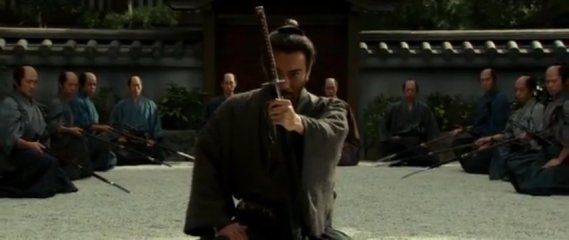I am going to commit a most worthy suicide.

Hot on the heels of 13 Assassins, Takashi Miike directed his second remake of a '60s samurai film in as many years with 2011's Hara-Kiri: Death of a Samurai, based on the same story as Masaki Kobayashi's 1962 classic. He even went so far as to shoot it in 3-D, but I was more than happy to view the "flat" version. Some stories simply do not need gimmickry in order to sell themselves, and this is most definitely one of them.
Set in the early 17th century during a time of peace, when masterless samurai could have a hard time getting by, the story is about one such ronin (Ebizô Ichikawa, who is dignity personified) who asks for permission to commit suicide in the courtyard of a highly respected clan. His request troubles chief retainer Kôji Yakusho since it reminds him of another, younger samurai (Eita) who asked the same thing two months earlier and was made to go through with it (at the insistence of his sadistic second, Munetaka Aoki) in order to discourage future "suicide bluffs." Ichikawa makes plain that he's not bluffing and insists on having the same second, witness and attendant as Eita, but when all three turn out to be absent, he goes on to tell Yakusho exactly why he wound up on their doorstep.
From there, the film (which was scripted by Kikumi Yamagishi, who wrote Miike's gonzo zombie musical comedy Happiness of the Katakuris one decade earlier) goes into an extended flashback that lays out Ichikawa's connection to Eita and how, alongside his frail daughter (Hikari Mitsushima), they faced sickness, hunger and dire poverty after the collapse of their clan. Aided by Ryuichi Sakamoto's poignant score, this is Miike at his most measured, and his restraint pays off in a climax that packs a powerful emotional punch. Even if it doesn't quite measure up to Kobayashi's original (which is perfect in just about every way), this Hara-Kiri certainly has nothing to be ashamed of.